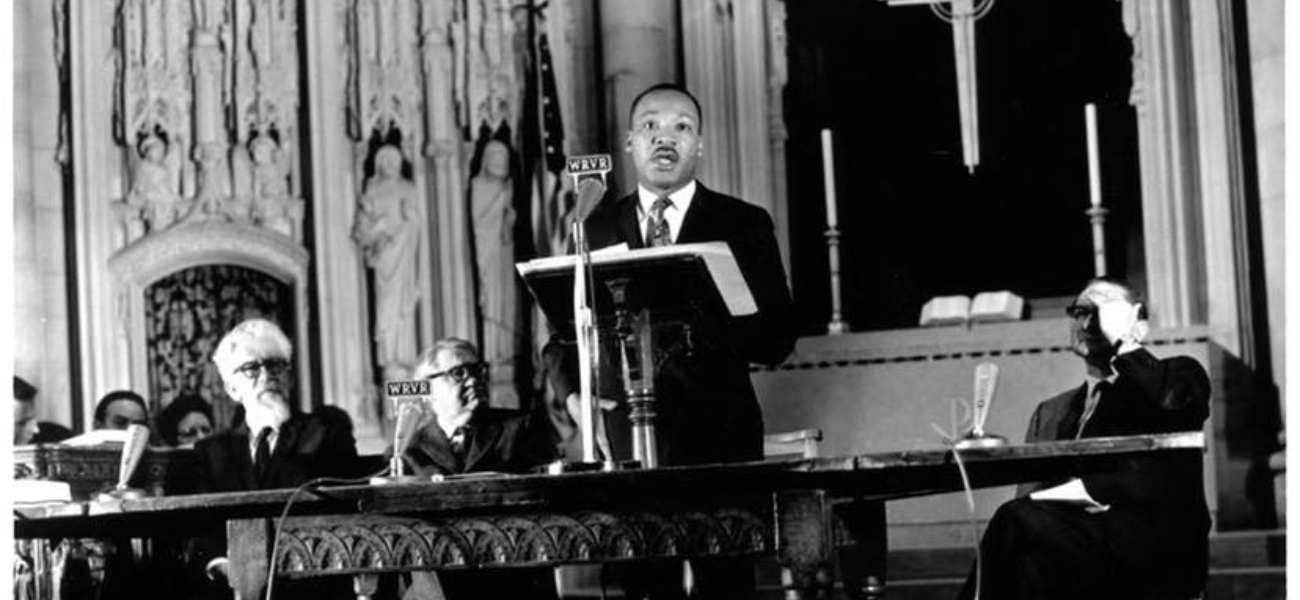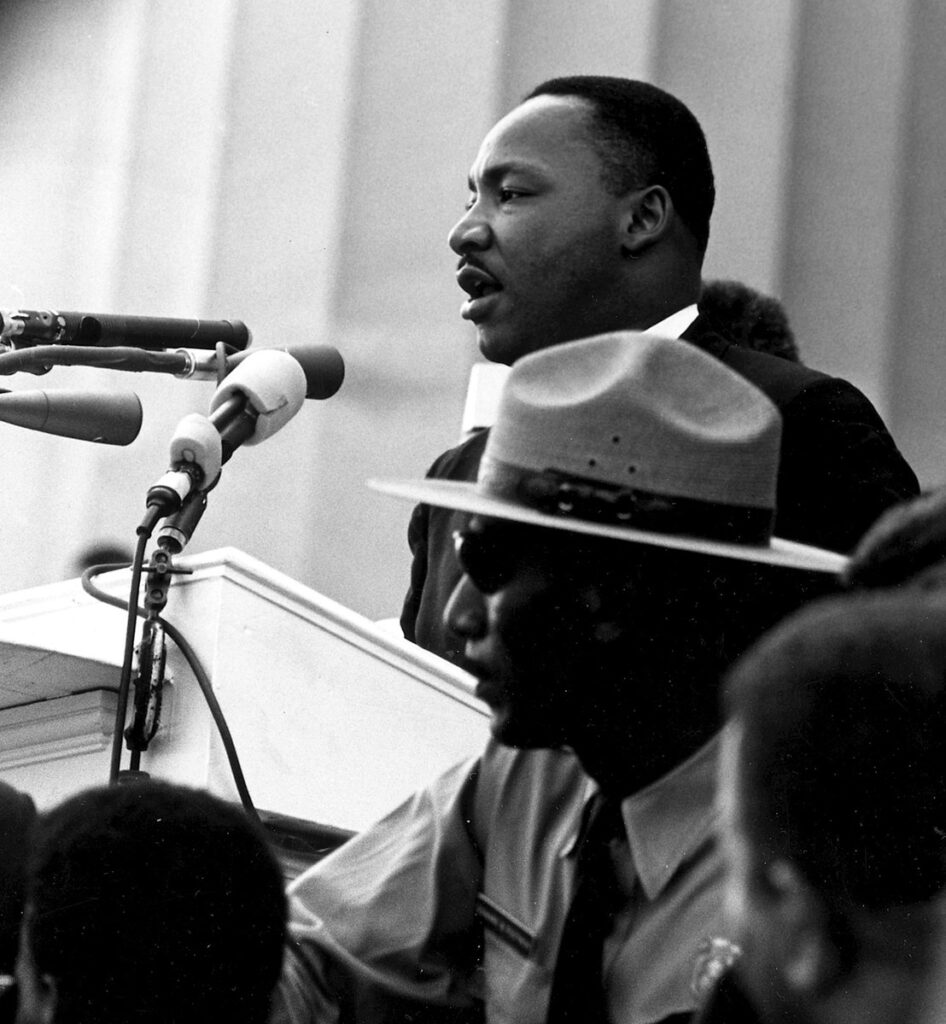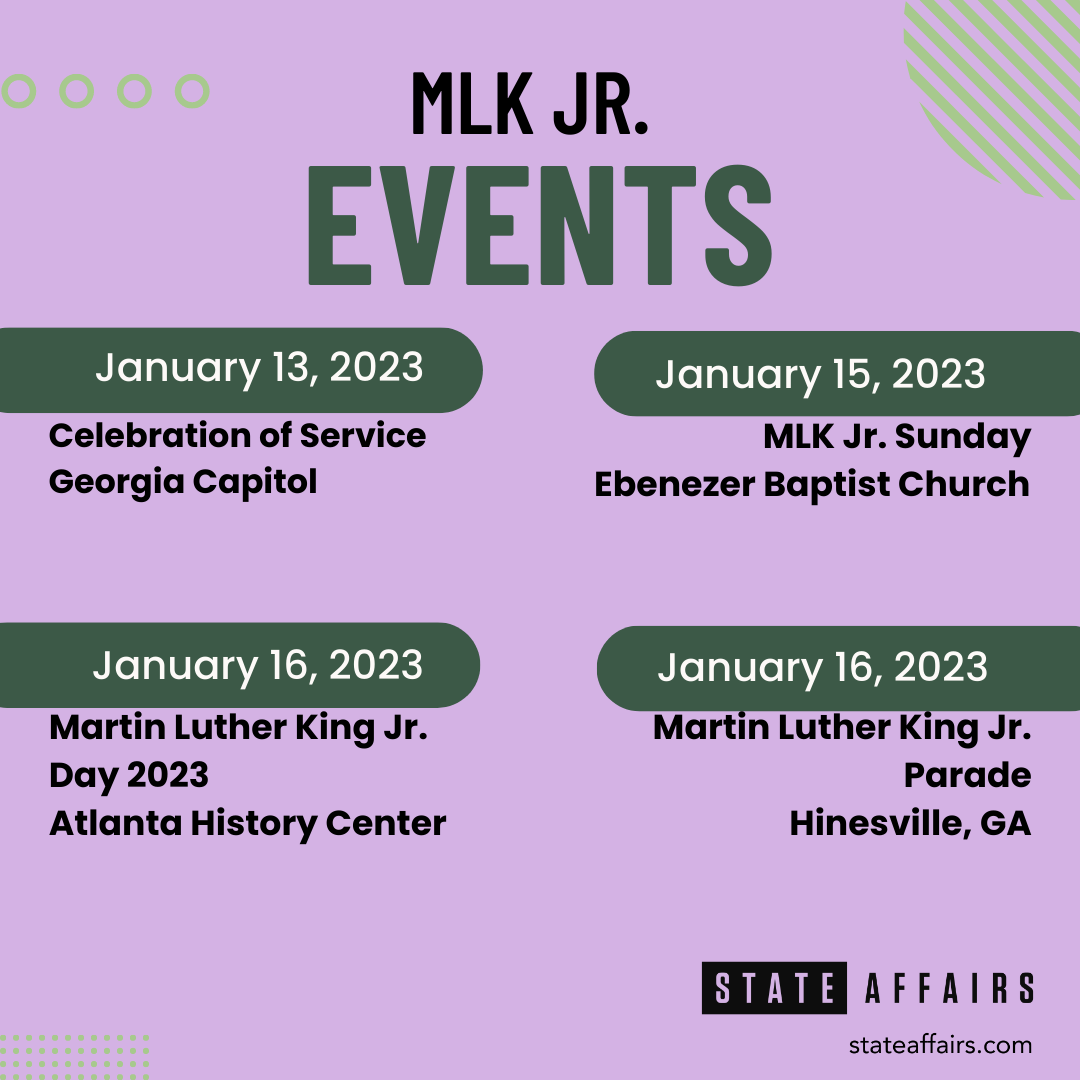Stay ahead of the curve as a political insider with deep policy analysis, daily briefings and policy-shaping tools.
Request a Demo
April 4, 1967 at Riverside Church in New York City. Left to right: Rabbi Abraham Joshua Heschel, historian Henry Steele Commager, Rev. Dr. Martin Luther King Jr., Dr. John Bennett, President of Union Theological Seminary in NYC. (Credit: John C. Goodwin, courtesy of Riverside Church)
On April 4, 1967, Dr. Martin Luther King Jr. rose from his seat at the Riverside Church in New York City and strode to the podium in the middle of the sanctuary for what would be one of the most provocative speeches of his life.
“Beyond Vietnam: A Time to Break Silence,” written by historian Vincent Gordon Harding with numerous redrafts by King, was a bold indictment against American involvement in the Vietnam War by the young preacher who had become the public — and often reviled — face of the American civil rights movement.
The speech was a radical departure from his Lincoln Memorial “I Have A Dream” speech and drew criticism from The Washington Post and The New York Times. Even the NAACP, the nation’s oldest civil rights organization, denounced King for tying the civil rights movement to the anti-war movement.
A year later — to the day — King was dead, felled by an assassinʼs bullet.
As America prepares to celebrate King’s birthday this weekend (he would have been 94 on Sunday), schools, civic and religious organizations, scholars and others will reflect on one of Georgia’s most famous native sons and his impact on the American civil rights movement.
The 39th Annual Dr. Martin Luther King Jr. Celebration of Service will be held Friday at 11 a.m. in the north wing of the State Capitol. President Joe Biden will speak Sunday at Ebenezer Baptist Church in Atlanta, where King was ordained as a minister at the age of 19 and where he later co-pastored with his father. On Monday, the national holiday, the Atlanta History Center has a day of activities commemorating King.
It’s a year of milestones for the slain civil rights icon. April 4 will be the 55th anniversary of his death. The 60th anniversary of his "I Have a Dream Speech" in Washington, D.C., is Aug. 28.

In just 13 years — between 1955 until his assassination in 1968 — King was instrumental in leading the integration of America’s buses, hotels, restaurants, schools and other public accommodations. Two important pieces of legislation — the landmark Civil Rights Act of 1964 and the Voting Rights Act of 1965 — also emerged during that time, prohibiting discrimination and enabling Blacks to vote. Each law was hewn from miles of marching and bloody protests.
Closer to home, King’s legacy influenced Georgia politicians like Atlanta Mayor Maynard Jackson to push for affirmative action.
In 2017, a statue of King was unveiled on the grounds of the Georgia State Capitol, overlooking Liberty Plaza.
“Dr. King was the face of the movement, the spirit of the movement,” Atlantan Tom Houck told State Affairs. Houck, 75, served as the driver and personal aide to King and his family from 1966 until King’s assassination on April 4, 1968. Today, Houck is the owner and operator of Civil Rights Tours Atlanta.
“What he did was unlike any other person. He had his finger on everything. He changed the face of the country and the world, and all of the things we see today in the realm of progress and civil rights,” Houck said.
His influence also laid the foundation for social and political advancements: growth in the Black middle class and representation of people of color in Congress. One in 4 voting members of the U.S. Congress identifies their race or ethnicity as other than non-Hispanic White, making the 118th Congress the most racially and ethnically diverse.
Few would deny the influence of King’s legacy on the election of Barack Obama as the country’s first Black president. And in Georgia, the late U.S. Rep. John Lewis and Sen. Raphael Warnock, the senior pastor of Ebenezer Baptist Church, are two examples.
Perhaps no other place encapsulates the mind of King better than his home state of Georgia which has some of his vast collections of sermons, writings and speeches, including “Beyond Vietnam.”
Some 13,000 items make up the Martin Luther King Jr. Collection at The Robert W. Woodruff Library in the Atlanta University Center. The historical body of work is owned by Morehouse College, King’s alma mater.
Stored in a vault the size of a small walk-in closet, the collection spans from 1944 to 1968 and includes a Bluebook King used during a Bible exam while a student at Morehouse, drafts of his Nobel Peace Prize lecture and acceptance speech, the eulogy he gave for three of the four girls killed in the 1963 church bombing in Birmingham, and the partially-typed draft of his dissertation for the doctoral program at Boston University. The collection also includes King’s correspondence with presidents John F. Kennedy and Lyndon B. Johnson as well as human rights activist and Muslim minister Malcolm X, and 1,100 books from Kingʼs personal library and the briefcase he was carrying when he was assassinated.
King’s work was a “blueprint for the struggle,” said Vicki Crawford, director of the Morehouse College Martin Luther King Jr. Collection. “Not only that, [King] leaves an important legacy for transformative leaders of the 21st Century.”
Crawford said the civil rights movement is part of a continuum of struggle.
“It takes different forms,” said Crawford, a civil rights scholar. “What I see is the timelessness and the universality of Kingʼs ideas. It goes on.”
The collection remains “a tremendous responsibility” that Crawford relishes. It extends beyond its Woodruff library home. Morehouse has a partnership with the Center for Civil and Human Rights where some of the collectionʼs materials are displayed.
Going forward, Crawfordʼs vision for the collection is two-fold. She wants to expose more young people to the collection and its various programs. She also is working to create a “national and international footprint” for the collection.
The Morehouse collectionʼs own story is an intriguing one. The collection was slated to be auctioned at the famed Sothebyʼs in New York, but a group of Atlantaʼs civic and corporate leaders, known as the Atlanta Community Foundation, as well as former Mayor Shirley Franklin, intervened and purchased the collection for $32 million to ensure that it remained in Atlanta, Kingʼs hometown.
Emory Political Science Professor Andra Gillespie cautions against deifying King.
“It’s important for us to dismantle this notion of a unitary, charismatic leader. That has proven to be problematic in many different instances,” said Gillespie, who is also director of the James Weldon Johnson Institute for Race and Difference at Emory. “But I can't deny the importance and the leadership role that King played in nonviolent protests that helped to dismantle Jim Crow segregation, helped to create voting rights for African Americans, [gave] Blacks the right to vote, the ability to be influential in elections, not only statewide but nationally.”
King didn’t act alone, Gillespie added. Major civil rights groups such as the NAACP, the Southern Christian Leadership Conference (SCLC), The Student Non-Violent Coordinating Committee (SNCC), and the Congress of Racial Equality (CORE) played decisive roles as well.
“There’s still work to do,” Gillespie said. “Inequality still persists. Rights that people fought for 60 years ago are still the challenge today. So the lesson for all of us, is each generation [is] fighting for securing rights. We've seen evidence of that. So as much as Black Lives Matter critiques the long civil rights movement of the mid-20th century, they all stand on their shoulders. Many of these activists are very self-aware that they are building on the work of what [King] did.”

The King Center has a full calendar of 2023 King Holiday Observance Events.
Celebrate the life and legacy of Dr. Martin Luther King, Jr. at events across Georgia.
The Otis Redding Foundation released a new song, “Show Love,” written and produced by students ages 12-18. The song is based on a sermon “Loving Your Enemies” which Dr. King delivered at Dexter Baptist Church in Montgomery, AL on November 17, 1957, and includes a live excerpt of the sermon.

Tammy Joyner is State Affairs’ senior investigative reporter in Georgia. A Georgia transplant, she has lived in the Peach State for 28 years. You can reach her on Twitter @LVJOYNER or at [email protected].
Twitter @STATEAFFAIRSGA
Facebook @STATEAFFAIRSUS
LinkedIn @STATEAFFAIRS
Header image: April 4, 1967 at Riverside Church in New York City. Left to right: Rabbi Abraham Joshua Heschel, historian Henry Steele Commager, Rev. Dr. Martin Luther King Jr., Dr. John Bennett, President of Union Theological Seminary in NYC. (Credit: John C. Goodwin, courtesy of Riverside Church)
Read this story for free.
Create AccountRead this story for free
By submitting your information, you agree to the Terms of Service and acknowledge our Privacy Policy.
House speaker Jon Burns hires new communications director
House speaker Jon Burns, R-Newington, announced today that he has hired a new communications director. Kayla Roberson, who has served as press secretary at the Georgia Chamber for the past year or so, will now oversee all external communications, media relations and strategic messaging for Burns.
“I’m excited to welcome Kayla to our team,” Burns said in a statement. “Kayla has an excellent background, deep skill set and strong work ethic, and we’re excited to have her on board to continue getting our message out and sharing the House’s priorities ahead of and into the next session.”
A double major in political science and journalism at the University of Georgia, where she graduated in 2022, Roberson interned for U.S. Rep. Andrew Clyde, a Republican in north Georgia’s 9th Congressional District, and worked as a consultant for GOP political candidates before joining the Georgia Chamber.
“I’m beyond grateful for the opportunity to work under the leadership of speaker Burns,” Roberson told State Affairs. “Whether it’s improving education opportunities, putting money back in the pockets of hardworking Georgians, creating jobs or supporting our rural communities, speaker Burns always prioritizes doing what is best, and what is right, for Georgia.”
Political strategist Stephen Lawson, who has held the top communications role for the speaker since last December, announced he’s joining Dentons, where starting today he’ll lead the global law firm’s public affairs efforts.
Have questions or comments? Contact Jill Jordan Sieder on X @journalistajill or at [email protected].
Global bird flu disrupts Georgia exports, costing chicken producers millions
ATLANTA — A global bird flu that has rapidly spread from birds to dairy cows, milk supplies and humans has cost untold millions of dollars in lost export business in Georgia, the nation’s leading poultry producer, officials with the state Department of Agriculture and poultry industry said.
Georgia has had only three reported cases of H5N1 avian influenza since it reemerged in 2022. The last of those cases was resolved in November 2023 but ramifications of those outbreaks continue to have a big effect on the state’s ability to export chicken and chicken parts, such as chicken feet, to different countries, including China, one of Georgia’s biggest export markets for chicken feet.
In 2022, frozen chicken feet, for example, accounted for more than 85% of all U.S. poultry exported to China, according to Farm Progress, publisher of 22 farming and ranching magazines.
The $30 billion poultry industry is Georgia’s largest segment in its No. 1 industry — agriculture.

China has also placed a ban on the import of chicken products from 41 other American states. The ban on Georgia products went into effect Nov. 21, 2023. Efforts to reach the Chinese Embassy in Washington, D.C. were unsuccessful.
Georgia Poultry Federation President Mike Giles estimates the state’s loss at “well into the millions of dollars.”
“It’s a significant amount in a significant export market for us,” he said. “Poultry paws [feet] immediately lose value because of the loss of demand.”
The ban has forced Georgia poultry producers to find alternative markets for their products that would normally be headed to China.
“Some are sold domestically, some are frozen and stored, hopefully to find markets later on, and some go to other countries,” Giles said.
This isn’t the first time China has banned U.S.-produced poultry products due to a bird flu outbreak. The country instituted a ban in January 2015 which lasted until November 2019 — even though U.S. poultry products were deemed free of the disease by August 2017.
After that ban was lifted, China’s appetite for American-produced chicken products became voracious.
In 2022, U.S. producers shipped nearly $6 billion in poultry meat and related products (excluding eggs) to over 130 countries. China has emerged as the second largest destination for U.S. poultry exports, increasing from $10 million in 2019 to a record $1.1 billion in 2022, according to Southern Ag Today.
Chicken paws, for instance, are eaten in many Asian countries, including the Philippines, Thailand, Indonesia and Korea.They can also be found on Chinese dim sum menus throughout the U.S. and are also popular in Jamaica, Trinidad, Russia and Ukraine in everything from soups and curries to fried snacks.
Three Georgia counties have reported H5N1 outbreaks since 2022. The most recent case was late last year. Henry, Sumter and Toombs counties each reported one case of H5N1 bird flu. Those outbreaks are resolved, poultry and state agriculture officials say.
“When HPAI cases are found in any state, that state is given a designation that could lead to foreign countries halting trade on poultry products from that state,” Georgia Department of Agriculture spokesman Matthew Agvent told State Affairs.
Not since 2016 has the United States experienced such a fast-moving case of the H5N1 avian influenza. In the last two months, the virus has spread in parts of the United States from birds to dairy cows, some milk supplies and humans. Two people — a Texas dairy worker and a prison inmate in Colorado who was killing infected birds at a poultry farm — are reported to have caught the virus, according to news reports. The outbreak is the largest in recent history, impacting both domestic poultry and livestock as well as wild birds and some mammal species.
State officials are continuing to monitor the national outbreak and its impact on Georgia.

Georgia’s poultry & egg industry: At A Glance
Annual economic impact: $30.2 billion
Percentage of the Agriculture industry: 58% *
Jobs: 87,900
Counties involved in poultry & egg production: 3 out of 4
National ranking in chicken broiler production: No. 1
Daily production of table eggs: 7.8 million
Daily production of hatching eggs: 6.5 million
Pounds of chicken produced daily: 30.2 million
Pounds of chicken produced annually: 8 billion
Number of chicken broilers processed each day: 5 million
Counties involved in poultry & egg production: 3 out of 4
Source: Georgia Poultry Federation; The Center for Agribusiness & Economic Development, University of Georgia, Ag Snapshots 2024; Georgia Poultry Federation.
Have questions? Contact Tammy Joyner on X @lvjoyner or at [email protected].
Is it safe to eat chicken and eggs and drink milk? Answers to your most pressing questions about the latest bird flu outbreak
A two-year-old strain of bird flu has heightened concerns in Georgia and the rest of the country after the virus recently spread to dairy cows. Here’s what you need to know about the virus and its impact on Georgia and the rest of the country. What are the symptoms of this flu in humans? Eye …
Kemp signs bills on education, health care, taxes
Gov. Brian Kemp signed a slew of bills over the past week or so, including the private school voucher bill long sought by Republicans and a bill that will ease regulations over the construction and expansion of medical facilities in rural areas.
His bill-signing events were clustered into themes: education, health care, military members, human trafficking and Georgia’s coastal communities.
Education
Among the education-related bills Kemp signed was Senate Bill 233, also known as the Georgia Promise Scholarship Act, which provides the families of Georgia students enrolled in underperforming school districts with $6,500 scholarships that can be used toward private school or homeschooling expenses, including tuition, fees, textbooks and tutoring.
“Georgia is affording greater choice to families as to how and where they receive their education, while also continuing our efforts to strengthen public schools, support teachers, and secure our classrooms,” Kemp said, and thanked leadership in the House and Senate for prioritizing passage of the bill, which had failed in a close vote in 2023.
Democrats and many public education advocates who opposed the bill argued it will drain resources from public schools and primarily benefit students from wealthy families.
Kemp also signed Senate Bill 351, sponsored by nine Republican senators, which will require social media companies, as of July 1, 2025, to verify their users are at least 16 years old unless they receive approval from a parent.
House Bill 409, sponsored by Rep. Lauren Daniel, R-Locust Grove, directs school systems to consider not having bus stops where a student would have to cross a roadway with a speed limit of 40 mph or greater. The bill also increases the penalty for passing a stopped school bus to $1,000 from $250.
Kemp noted that Ashley Pierce, the mother of Addy Pierce, an 8-year-old who was fatally struck by a motorist as she boarded her school bus, “passionately advocated for and was instrumental in the passage of this legislation.”
Senate Bill 395, sponsored by Sen. Clint Dixon, R-Gwinnett, states that no school visitor or personnel can be prohibited from possessing an opioid reversal drug such as Narcan and directs schools to maintain a supply. It also allows opioid antagonists to be sold in vending machines and directs certain government buildings to maintain a supply of at least three doses.
Senate Bill 464, also sponsored by Dixon, creates the School Supplies for Teachers Program to financially and technically support teachers purchasing school supplies online. It also creates an executive committee of five voting members within the Georgia Council on Literacy and limits the number of approved literacy screeners to five, one of whom must be available to schools for free.
Health care
The governor chose his hometown of Athens as the venue to sign several bills aimed at improving health care in rural and underserved communities.
Among them was House Bill 1339, sponsored by Rep. Butch Parrish, R-Swainsboro, which revises the Certificate of Need process by which the state determines if and how new medical facilities can be built or expanded. The bill provides for several new exemptions, including psychiatric or substance abuse inpatient programs, basic perinatal services in rural counties, birthing centers and new general acute hospitals in rural counties. It also raises the total limit on tax credits for donations to rural hospital organizations to $100 million from $75 million.
Senate Bill 480, sponsored by Sen. Mike Hodges, R-Brunswick, establishes student loan repayments for mental health and substance use professionals serving underserved youth in the state or in unserved geographic areas disproportionately impacted by social determinants of health.
House Bill 872, sponsored by Rep. Lee Hawkins, R-Gainesville, chair of the House Health and Human Services Committee, expands cancelable loans for certain health care professionals to dental students who agree to practice in rural areas.
Senate Bill 293, sponsored by Sen. Ben Watson, R-Savannah, chair of the Senate Health and Human Services Committee, reorganizes county boards of public health and opens the qualifications for the CEO of each county board of health to include either licensed physicians or people with a master’s degree in public health or a related field.
Military members and veterans
Kemp on Wednesday focused on bills to improve military recruitment and provide more work opportunities for veterans and military family members.
House Bill 880, sponsored by Rep. Bethany Ballard, R-Warner Robins, allows spouses of military service members to work under a license they hold in good standing in another state while under the supervision of an existing Georgia medical facility or provider.
Senate Bill 449, sponsored by Sen. Larry Walker, allows military medical personnel to practice for 12 months while a license application is pending, including working as a certified nursing aide, certified emergency medical technician, paramedic or licensed practical nurse. The bill also creates a new advanced practice registered nurse license and makes it a misdemeanor to practice advanced nursing without a license.
Human trafficking
The governor on Wednesday was accompanied by first lady Marty Kemp and other members of the GRACE Commission for the signing of an anti-human trafficking package. It includes Senate Bill 370, which adds certain businesses to the list of organizations that must post human trafficking notices, including convenience stores, body art studios, businesses that employ licensed massage therapists and manufacturing facilities.
Sponsored by Sen. Mike Hodges, R-Brunswick, the bill also allows the Georgia Board of Massage Therapy to initiate inspections of massage therapy businesses and educational programs without notice and requires massage therapy board members to complete yearly human trafficking awareness training.
House Bill 993, sponsored by Rep. Alan Powell, R-Hartwell, creates the felony offense of grooming of a minor and creates new penalties for offenses relating to visual mediums depicting minors engaged in sexually explicit conduct.
House Bill 1201, sponsored by Rep. Houston Gaines, R-Athens, allows human trafficking survivors who received first offender or conditional discharge status to vacate that status for certain crimes, as long as the crime was a direct result of being a victim of human trafficking.
Coastal communities
Earlier today in Brunswick, Kemp signed legislation impacting Georgia coastal communities, including House Bill 244, which amends the laws around how wild game can be hunted and how seafood dealers operate, and House Bill 1341, which designates white shrimp as the state’s official crustacean.
Taxes
Earlier this month Kemp signed several bills related to taxation, including House Bill 1015, sponsored by Rep. Lauren McDonald, R-Cumming, which lowers the state income tax for tax year 2024 to 5.39%, accelerating a multiyear drop in state income taxes that started at 5.75% in 2023 and will continue through 2029.
The Governor’s Office of Planning and Budget estimates the tax cut acceleration will save Georgia taxpayers approximately $1.1 billion in calendar year 2024 and about $3 billion over the next 10 years.
Kemp also signed House Bill 1021, sponsored by Rep. Lauren Daniel, R-Locust Grove, which increases the state’s income tax dependent exemption to $4,000 from $3,000.
House Bill 581, sponsored by Reps. Shaw Blackmon, R-Bonaire, and Clint Crowe, R-Jackson, enables a constitutional amendment (House Resolution 1022) to let voters decide whether counties can provide a statewide homestead valuation freeze, which limits the increase in property values to the inflation rate.
The governor has until May 7 to sign or veto bills passed during the legislative session that ended on March 28. Those he takes no action on will automatically become law.
Legislation signed by Kemp is posted on the governor’s website.
Read these related stories:
Have questions, comments or tips on education in Georgia? Contact Jill Jordan Sieder on X @journalistajill or at [email protected].
Facebook @STATEAFFAIRSGA
Instagram @STATEAFFAIRSGA
LinkedIn @STATEAFFAIRS




